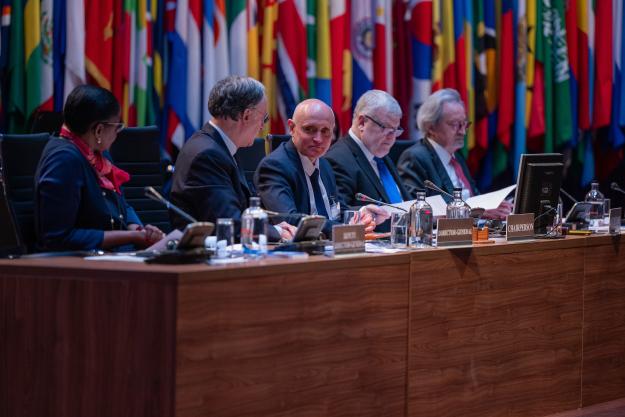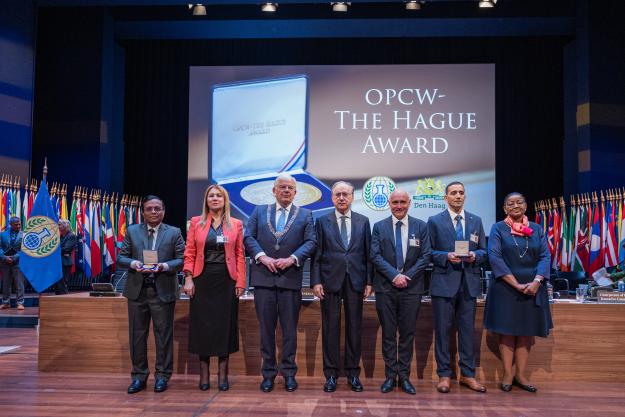The Twenty-Ninth Session of the Conference of the States Parties to the Chemical Weapons Convention (CSP-29) opened today in The Hague, Netherlands. The session is livestreamed on the OPCW website.
"Today's international environment is especially challenging and characterised by escalating tensions and constant pressure on the global security architecture. More than ever, the responsibility of the Conference of the States Parties to promote and defend the Chemical Weapons Convention, is brought to the fore," said OPCW Director-General, Ambassador Fernando Arias, at the opening of the Conference.
Key discussion topics during the Conference will be:
the status of the implementation of the Chemical Weapons Convention (CWC);
addressing the threat of chemical weapons use;
developments in science and technology, including emerging technologies, such as Artificial Intelligence, which impact the CWC's implementation;
engaging with the chemical industry and the scientific community to advance the implementation of the Convention;
promoting peaceful applications of chemistry and ensuring safe production and secure use of chemicals;
the OPCW Programme for Africa;
promoting universality of the CWC;
strengthening institutional governance at the OPCW.
The Conference is chaired by the Permanent Representative of Bosnia and Herzegovina to the OPCW, H.E. Mr Almir Šahović, who assumed his duties from the outgoing Chairperson, Permanent Representative of Pakistan to the OPCW, H.E. Mr Suljuk Mustansar Tarar.

Podium, 29th Conference of the States Parties (CSP-29)
On Monday, 25 November, an official ceremony for the OPCW-The Hague Award was held. This year the award honours two recipients:
Algeria's National Institute of Criminalistics and Criminology of the National Gendarmerie (NICC/NG)
NICC/NG is a forensic science institute focused on advancing crime-fighting capabilities by integrating scientific methods into judicial and criminal processes. In 2024, NICC/NG joined OPCW's global Designated Laboratories network, bolstering chemical security across the continent and contributing to international non-proliferation efforts. NICC/NG became the first laboratory in Africa to achieve OPCW designated laboratory status since 2006. The Institute has played a vital role in promoting regional capacity-building by supporting key initiatives such as the "CHEMEX Africa" in October 2023.
Indian Chemical Council (ICC)
ICC is a chemical industry body recognised for its role in promoting chemical safety, compliance with the Convention, and enhancing industry-wide security practices in India. Through initiatives like the CWC Helpdesks, ICC has increased industry compliance and facilitated efficient e-filing for chemical declarations. Additionally, ICC's 'Nicer Globe' initiative has had a substantial impact on chemical transportation safety in India, offering real-time monitoring and emergency response capabilities. ICC has conducted other activities to promote chemical safety and security through its 'Responsible Care' programme and the introduction of the Security Code of RC. Their focus on enhancing industry security and advancing national implementation of the Convention in one of the world's largest chemical sectors demonstrates an outstanding commitment to responsible industrial stewardship.

Group photo with winners of the 2024 OPCW-The Hague Award
On Wednesday, 27 November, the Day of Remembrance for All Victims of Chemical Warfare will be observed with a minute of silence. The Conference will reaffirm its commitment to the norm against chemical weapons in all circumstances.
A number of side events focusing on topics related to the CWC are taking place in the margins of the Conference.
Background
The Conference of the States Parties (CSP) is the principal and plenary organ of the Organisation for the Prohibition of Chemical Weapons (OPCW), composed of the OPCW's 193 Member States. The weeklong annual meeting of the Conference brings together high-level officials from OPCW Member States, as well as representatives from international organisations, the chemical industry, and civil society. The CSP oversees the implementation of the Chemical Weapons Convention (CWC), promotes the Convention's objectives and reviews compliance with the treaty.
The CSP, at its 20th Session, decided that a Memorial Day of Remembrance for all Victims of Chemical Warfare would be observed annually during the Conference. This commemoration provides an opportunity to pay tribute to the victims of chemical warfare, as well as to reaffirm OPCW's commitment to achieve a world free of chemical weapons.
As the implementing body for the Chemical Weapons Convention, the OPCW, with its 193 Member States, oversees the global endeavour to permanently eliminate chemical weapons. Since the Convention's entry into force in 1997, it is the most successful disarmament treaty eliminating an entire class of weapons of mass destruction.
In 2023, the OPCW verified that all chemical weapons stockpiles declared by the 193 States Parties to the Chemical Weapons Convention since 1997 - totalling 72,304 metric tonnes of chemical agents - have been irreversibly destroyed under the OPCW's strict verification regime.
For its extensive efforts in eliminating chemical weapons, the OPCW received the 2013 Nobel Peace Prize.






